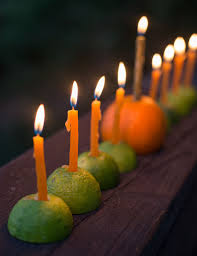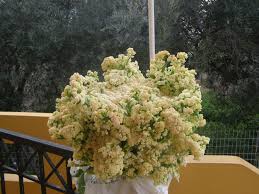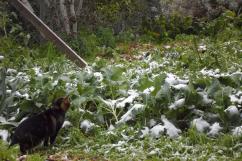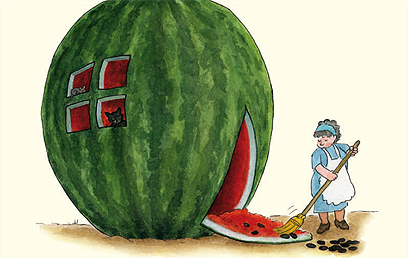Summer Alert -in the garden and at home
Hot, hot, hot for us and for the vegetables 🙂
The juicy summer fruits give us energy and strength. When I say fruit I mean it botanically, in its broadest sense: the fruit is an organ of the plant, created from the flower, which contains seeds. I wrote about Fruits and Veggies here.
Some of the summer fruits that are at their peak now: plums, grapes, pears, papayas, melons, watermelons and all the other gourds – cucumber, zucchini, and all types of pumpkins – chestnut, butternut, Kabotche … yes, yes they are all fruit, just like the tomato, eggplant and pepper…. a very broad list; they all contain within them seeds and are therefore fruits. Think about it next time you make Israeli salad – tomatoes and cucumbers are actually fruits. 🙂
Whatever you call them, the season right now is overflowing with fresh, juicy produce that contains within it seeds.
The fruits that grow on bushes grow in gardens and fields. The plant remains in the garden a certain amount of time (seasonal) and continues to produce more and more flowers to make fruit until it is either finished giving fruit, or the season conditions become no longer suitable for it and it cannot continue to live.
The fruits that grow on trees come in a big wave and then finish. However, in conventional markets they can be found for a longer period than in the organic market. Remember that I wrote to you for several weeks to order fast, to be quick to catch them while you can?
Organic farming does not extend the shelf life of fruits by artificial conditions. Conventional farming practices have developed all kinds of techniques that extend the shelf life of the fruit. They control the levels of certain gases in the storage cells of the fruit, thus interfering with the natural maturation process that the fruit undergoes. Another method is to coat the fruit with wax to prevent fluid loss, disease and ripening. This process also improves the appearance of the fruit. In addition, a variety of chemicals have been developed, primarily fungicides and hormonal preparations, that are sprayed on fruit or fruit is dipped into them after harvest which serve to prolong shelf life. Some of these chemicals penetrate beyond the skin and enter the fruit tissue and act within it. Accordingly, washing with soap and water will not clear these materials, they remain inside the fruit!
All this is of course contrary to the organic approach and the use of these materials is totally forbidden. Organic fruits and vegetables are picked in season and the idea is to arrive clean and healthy to the consumers.
So what should you do at home?
1. One of the organic guiding principles is that we eat the produce during its season when it is fresh and healthy.
2. All ripe produce is immediately placed into the fridge to slow down the natural process of maturation.
I leave some of the fruits out of the fridge, so the kids see and eat. I love having a large fruit basket, colorful and inviting, but in the summer, despite the abundance, the large basket on the table is replaced by a smaller one and most the fruits are waiting in the fridge. I make sure about filling it so there will always be something inviting for those passing by, but most produce will wait in the fridge.
3. Because the fruit season is short, you must catch them quickly and carefully store them in a healthy and not toxic manner. More on storage of vegetables and fruits (including the greens – very difficult for them now) and here
And to the garden:
– Much more irrigation. I am known to be stingy with water and I am constantly monitoring the irrigation duration in plots and beds. In recent weeks, almost no day passed without giving extra.
– Shade nets were spread over many parts in the garden.
– We planted and sowed the last cycles for summer. Why? Because conditions are getting more difficult for leaf crops.
Take for example the lettuces. You surely noticed that the recent lettuces were smaller than previously. A lettuce that is now growing organically in the open is immediately "aware" of the difficult conditions it is facing and will try to reach maturity as fast as it can. Maturity of a plant means to propagate the next generation, which means producing seeds. The summer lettuce spends less energy in growing many leaves. It grows only the amount of leaves needed for it to reach maturity. Accordingly, the leaves of summer lettuce are narrow and small compared to the leaves of winter lettuce because it does not need so much surface area because there is so much intense sun for such a long period each day. In short, the summer lettuce is not as glorious as the winter lettuce and that is despite having lettuce species that were developed especially for the summer.
Few are the Greens that survive our summer. There is less variety of leafy greens and their size and quality are reduced as well. They stand in weather conditions that are extreme for them (most like cold and humidity) and thus are more vulnerable to pests. The heat causes faster life cycles of insects so crops are more exposed and vulnerable to them. Remember, the holes in the leaves are nature's stamp. They tell us that the smartest creatures in the world, those who know how to measure toxicity parameters more easily and faster (naturally) than we can, have already sampled the produce for us and have given confirmation that it is clean and healthy food J.
Have a good week!
Wishing everyone (including the garden crops) family time, freedom, fun, and getting through our Israeli summer healthy and strong.
Yours,
The Garden Staff and Maggie
And we can expect in our Summer Veggie baskets (or fruit ..)
Peppers
also hot ones 🙂
Mint
Zucchini
Squash
Corn
Cucumbers
Tomatoes
Small lettuce
Potatoes
Larger ones also:
Green onions
Eggplant
Beets
And green beans
Fruit baskets:
Grapes
And Melon
Larger ones also:
Pears
And Mangos










